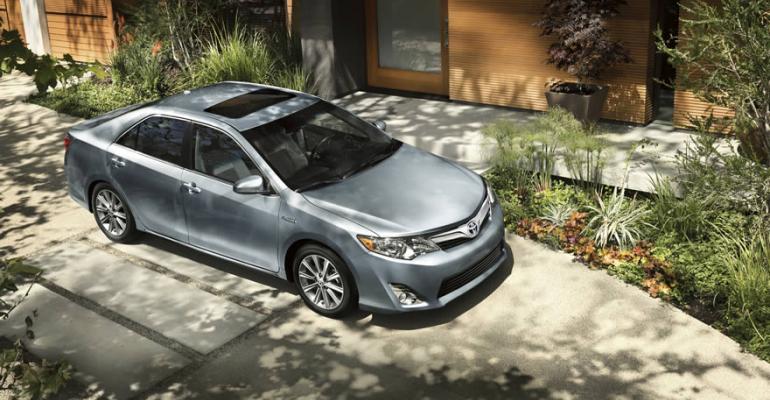Toyota Korea begins marketing the U.S.-built Camry sedan in both 2.5L conventional gasoline and 2.5L Camry Hybrid models, cutting prices by as much as 3 million won ($2,630) on both models from 2011 levels while adding luxury features and available options.
Toyota Korea CEO Tommy Nakabayashi says the auto maker has set a 2012 sales target of 10,000 units, double last year’s record. This year’s goal includes 6,000 Camrys, triple the number sold in Korea in 2011.
The Camry sedan is priced at 34 million won ($31,000) and the Camry Hybrid is priced at 42.9 million won ($38,000). Toyota Motor Mfg. Kentucky produces the vehicles at its Georgetown, KY, plant.
Spokesmen at the launch note that both the conventional gas-engine sedan and hybrid are equipped with a Korean-language LG Electronics GPS navigation system, along with other electronic features developed by Korea’s Samsung Electronics.
The Camry sales kickoff follows last November’s Korean launch of the Toyota Sienna minivan produced in Princeton, IN, by Toyota Mfg. Indiana.
Toyota Korea says it is importing the vehicles from the U.S. because of the high Japanese yen relative to Korean currency, and so it eventually can realize full benefits from the U.S.-Korea free-trade agreement when its terms are ironed out and approved.
This week’s Camry Hybrid sales launch spurred Hyundai to announce a price cut for its competing Sonata Hybrid sedan which already is priced much lower.
Hyundai has pulled some of the interior-luxury features from the Sonata Hybrid for the Korean market and will offer the trimmed-down version at 28.7 million won ($25,600).
A price reduction of 1.1 million won ($980) was achieved through deletions including the leather-wrapped steering-wheel feature, leather shifter knob, leather door trim and rear arm-rest assembly.
While it would be a modest price reduction in the U.S. market, analysts note that in Korea prices seldom are lowered for promotional purposes and the sticker price usually prevails.
Analysts say Hyundai is aiming to boost domestic sales of the hybrid, which is the auto maker’s key entry in the Korean market for eco-friendly vehicles.
Hyundai sold 7,195 Sonata Hybrids in Korea last year, compared with 10,368 in the U.S. Corporate-sibling Kia delivered 5,279 units of its K5 Hybrid in Korea, which is marketed as the Optima Hybrid in the U.S.
Korea sales of the ’ 12 Sonata Hybrid launched in June 2011, following the domestic introduction of the Kia K5 Hybrid the previous month.
A Kia spokesman tells WardsAuto that, unlike Hyundai, his company has made no changes to the K5 that would result in lower prices.
The hybrid marketing effort by Hyundai and Kia is being strongly pushed by Hyundai-Kia Chairman Chung Mong-koo.




